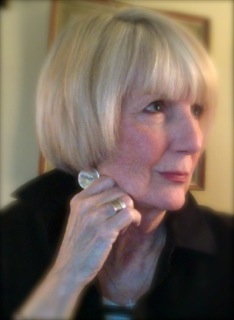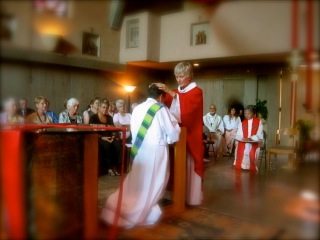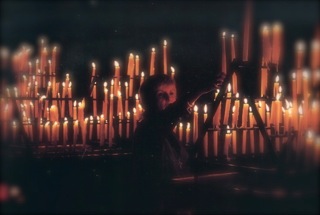Welcome to our Introvert Interviews series where we talk to introverts from all walks of life about their experiences and their introversion.
Sibyl Dana Reynolds is the author of two books, was elected as the first woman Bishop of the Roman Catholic Church in North America in 2008, and is currently leading spiritual retreats.
 You’ve written a book, Ink and Honey, about a community of women monks. What was the research process like for writing the book?
You’ve written a book, Ink and Honey, about a community of women monks. What was the research process like for writing the book?
Researching and writing Ink and Honey was a mystical and profoundly personal and spiritual process. Much of the writing was done during pre-dawn hours. My monk-like, introverted spirit has always found the time between the waning night and arriving dawn to be particularly potent with the Divine presence and sacred inspiration. Three or four a.m. was the time during my writing process when I went to my prayer room to light candles. Strangely, the same time of day in monastic communities when monks and nuns arise to begin their early morning prayers. At that holy hour, I settled into my cozy chair and opened my journal to record whatever I was graced to envision and hear with the eyes and ears of my heart. Some mornings nothing seemed to arrive, but I felt compelled to show up. Over the years the pages of my journal filled and then spilled into the computer to finally become Ink and Honey.
Much of what I wrote during that time, with regard to historical reference, was later affirmed for accuracy through research and study. Books seemed to appear when I needed them to provide additional information pertaining to topics in the story such as: the making of illuminated manuscripts, medieval folklore, and early Christian monasticism. Both my writing and research processes felt “guided” by an unseen hand in many instances.
What role do you think community has in spirituality?
Community has always been a foundational cornerstone for spirituality. Prayer, ritual, contemplation and reflection are tenets of the spiritual life. However, when these various facets are experienced and shared with others, the potential for enrichment for an individual’s personal journey is enhanced and nourished. Humans, by nature, are communal. We need the companionship of others for company, inspiration, and affirmation of what it means to be fully alive. In spiritual community we become witnesses for one another’s stories, challenges, questions, hopes and dreams. Spiritual community, when it is collaborative and co-creative, provides a sacred space for the Spirit to inspire and cultivate soul-growth and hope for the future.
You have a Masters Degree of Theology in Pastoral Ministry and become Ordained in the Catholic tradition. What led you on this path?
During my childhood, beginning when I first attended parochial kindergarten and throughout my mid-teens, I felt called to become a nun. When at last I was old enough to enter the convent my parents wouldn’t allow it but in my heart of hearts I continued to long for the religious life.
When I was sixteen I met my husband and several years later we were married. I became a mother and I’m now a grandmother, but my inner yearning to be part of a religious/spiritual monastic community never left me.
In 2004 a friend informed me that there was an international underground movement to renew priestly ministry and ordain women in the Roman Catholic Church. I researched the organization, Roman Catholic Womenpriests, and made my application to enter the ordination formation program. I was accepted and at that time I returned to school to complete a degree in Religious Studies and a Masters of Theology. I was ordained as Deacon in 2005, as Priest in 2006, and in 2008 I was elected as the first woman Bishop of the Roman Catholic Church in North America.
The Vatican refuses to recognize women’s ordination. Women who are ordained are automatically excommunicated by the Church. However, this doesn’t stop the Womenpriests. Their ministerial work includes creating faith communities for marginalized Catholics and others, serving as hospice chaplains, ministering to the homeless, etc.
I recently retired from active service as Bishop. My current ministry is spiritual direction for women and the facilitation of the feminine/creative process.
Can you tell me what it’s like to lead a 4-day retreat, and if you had your temperament in mind while organizing it?
I’ve been facilitating spiritual/creative retreats for nearly thirty years. [M]y introversion has been helpful with regard to the planning of a retreat and all the necessary preparations of materials, etc.
My retreats always include a sizeable portion of each day that is set aside for group silence and free time for journaling, prayer, art-making, and contemplative practices. The majority of the women who feel called to experience my work seem to also be introverts. Therefore, it’s important to me to provide a retreat experience that honors the introvert’s need for individual space, contemplation, and silence.
Do you do anything in particular to recharge before, during, or after the retreats?
The time before a retreat is energizing for me because I’m usually working in solitude to make all the preparations.
During the retreat I’m fully immersed in my passion for teaching, listening to others’ stories, offering inspiration, sharing and receiving wisdom from the group. However, while I’m facilitating a four or five day retreat, I find it important to awaken early for personal spiritual practice…prayer, journaling, and reflection. I’ve pleasantly discovered over time, that when I’m in alignment with my passion I am energized and refueled spiritually, intellectually, and creatively.
After a retreat I require several days of “down-time.” I go into solitude to process and reflect. Post-retreat is important for synthesizing all I’ve experienced. This allows me the spaciousness to simply “be” and to follow the impulses I receive moment by moment. My journal is a depository, a sacred vessel, where I pour out whatever I’m holding in my heart, mind, and spirit. I also engage my creative side during this time…weaving, knitting, or art-making help me to re-center before I return to my work and writing.
 If you were able to travel back in time, is there any advice you would give to your younger introverted self?
If you were able to travel back in time, is there any advice you would give to your younger introverted self?
My counsel to my “younger introverted self” would be for her to know her boundaries and limitations with regard to her output of energy. I would invite her to learn to recognize when she’s depleted by too much stress and extroverted activity and to remember the importance of giving herself permission to retreat for solitude, reflection, contemplation, and renewal.
There have been times in my life when I have pushed myself beyond my inner limits to accommodate others’ perceived needs for me to be extroverted. My emotional, physical, and spiritual health paid dearly on those occasions.
I have come to realize, through my many mistakes, that knowing my boundaries and limitations are essential to my well-being. Recognizing when I must say, “No” (and giving myself permission to do so) has been one my most challenging lessons to learn as an introvert.
Anything else you’d like to add?
Our world is becoming exceedingly extroverted. Social media and the Internet combined with everyday stress, traffic, over crowed conditions, and noise pollution…these things alone are incredibly challenging for the introverted soul. Additionally, the dwindling terrain for sacred places and spaces to foster renewal for the empathic, contemplative, creative spirit adds to the creation of a perfect storm. A perfect storm, leading many highly sensitive people to eventual physical and emotional breakdowns from over-exertion of their empathic and reclusive natures.
Never has it been more important for introverted spirits to practice extreme self-care. I have to remind myself continually of this fact because the norm of our culture is the hammering message to constantly be “out there” and when one is reclusive by nature the demands of the status quo can be crazy-making.
Thank God for introverts. We have the opportunity to model to our extroverted brothers and sisters how to unplug, stop and smell the roses, and simply take a break from incessant doing.
That being said, we can also learn from the extroverts. They have the ability to show us how to stretch ourselves a bit to reach out and connect with others. Ultimately, finding a unique point of balance between being and doing seems to be the key to living a full and fulfilling life.
Where can people find out more about you?
My novel, Ink and Honey, is available at Amazon.com.
Websites: InkandHoneythebook.com
SacredLifeArts.com
Blog at Patheos.com Search: Sacred Illuminations
On Facebook:Sacred Life Arts, Ink and Honey the Book


